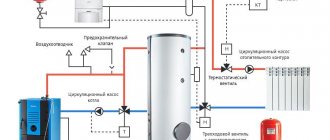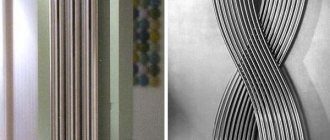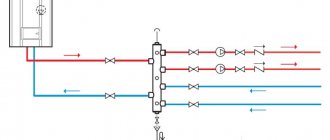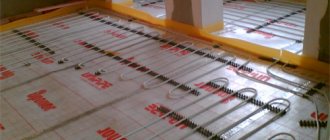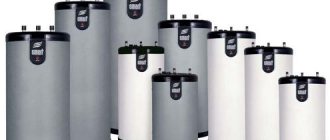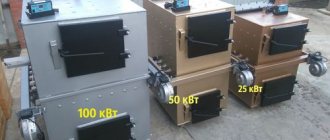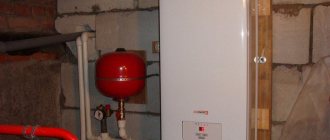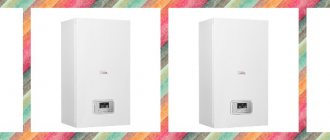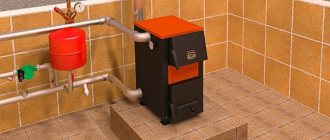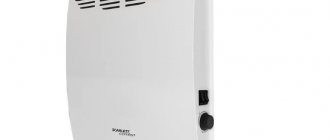Electric heating boilers are characterized by low cost, greatest comfort and ease of operation, high reliability, but heating using electricity is the most expensive.
The theoretical efficiency of all modern electric boilers is approximately 99%, that is, at maximum load, a boiler producing 9 kW of thermal energy will consume 9.091 kW of electricity. However, the efficiency of, for example, heating element electric boilers depends on the hardness of the water and the formation of scale on the heating element, so over time it can decrease to 90, 80 or even 70%. Then, more electricity will be required to heat the water to the same operating temperature.
Therefore, the efficiency of an electric boiler, first of all, depends on the principle of its operation, as well as the functionality of the control of the electric boiler: modulated power, scheduling modes, the ability to configure operation for periods of cheaper night tariffs.
Recommendations for selection
Why do people choose these devices?
Obviously, it’s all about the advantages over gas and wood-burning counterparts. Advantages of an electric heating system:
- There is no need to install a chimney to remove combustion products or connect additional ventilation. Accordingly, there are no restrictions on installation and coordination with housing and communal services authorities.
- Ease of control and programming of modes. Heating devices allow you to set the required coolant or air temperature on an external sensor.
- Possibility of using a differentiated tariff schedule. That is, during the day the cost of electricity is more expensive, at night, when peak consumption passes, it is 40-60% cheaper. If you purchase thermal accumulators as part of the boiler kit, you will save money by storing heat at night and using it during the day.
- Safety. The risk of system boiling and explosion is reduced to zero.
Heating a house with an electric boiler has the following disadvantages:
- High cost of electricity.
- Constant power surges damage the automation. The result is rapid defrosting and damage to the entire heating structure.
We list the main parameters and technical characteristics of boilers for heating systems, on which the choice depends:
- Manufacturer. It is better to consider products from well-known brands. The concerns have an extensive network of service centers that will provide quick and high-quality repairs.
- Power. Before going to the store, do not forget to carry out its correct calculation in accordance with the level of heat loss at home.
- Efficiency – no less than 95%. Electricity is the most expensive fuel, so productivity must be maximized.
- Security group. Mandatory: thermal fluid temperature limitation (up to +85 ºC), protection against overheating, dry running, pressure sensors and others.
- Number of circuits. Single-circuit boilers should be used strictly for their intended purpose, and for hot water supply, purchase separate storage boilers or indirect heating.
- Optional equipment. The piping of a high-power boiler must include a heat accumulator, a stabilizer, and if electricity is often cut off in the area, then generators running on diesel or gasoline fuel. The risk of heating system failure is reduced to zero.
To paraphrase well-known authors, we can say that electric boilers are not a luxury, but a means of heating in the harsh Russian winter.
An example of a real system with an intelligent control circuit for electric heating at home
NOBO, a leading European manufacturer of convectors, produces two compatible systems for “smart” control of electrical appliances. Including “warm floors” (via a thermostat) and any other household appliances that are connected to the network (via a panel, a “break” in the circuit or turning on/off sockets). To do this, they produce special thermostats, socket receivers and hidden-mounted relay receivers.
Using such a system, you can monitor and manage the operation of up to 100 devices or group zones. And thermostats of the 700 series provide 4 operating modes for convectors: comfortable, economical, non-freezing (air temperature 7°C) and “off”. According to the manufacturer, the flexibility of such a control system for convectors and heated floors allows you to save up to 25% on electric heating at home.
One of two control schemes for a multi-zone electrical system Source stroydoma74.ru
Video instructions for installing the economical Galan boiler
The undeniable advantage of such a boiler is its fast heating. high fire safety, no connectors. which often cause leakage. At the same time, the boiler operates even at low power, which other types of boilers cannot do. Unlike conventional heating elements, scale cannot be deposited on such boilers
And what is very important, the performance of such a boiler does not decrease over time. And their service life reaches 25 years or more
Organizing heating using a gas boiler is considered the most economical and convenient. However, for people living in areas where there is no central gas pipeline, they have to look for other options. In particular, a solid fuel or electric boiler, and more and more people are leaning towards the latter. This is due to the fact that in the first case it is necessary to purchase fuel and be able to heat it correctly, because with a small amount of firewood or poor coal, this is a real science.
The only disadvantage of electric heating is the dependence on energy supply and increased power, which also causes increased costs. Therefore, the question arises, what is the most economical electric heating boiler? The household product category includes models with a power of 3-60 kW, although in most cases it is no longer practical to install boilers larger than 10 kW due to possible network overload. Thinking about how to choose the most economical electric heating boiler, we can say that a power of 5 kW is quite enough to heat an area of 80 square meters, i.e. for a large three-room apartment or an average house.
People who have the opportunity to choose between several methods of organizing heating involuntarily have a question: which boiler is more economical - gas or electric? We can definitely say, assessing current energy prices, that gas heating will be much more economical. If an exclusively electric option is considered, then it is necessary to highlight several ways to increase its efficiency:
• purchase a modern, more expensive model with a built-in thermostat, which allows you not to “overheat” the room when weather conditions improve;
• ensure high-quality thermal insulation of the house by making an external coat, installing dense sealants on windows and doors, etc.;
• install a two-zone meter that calculates the electricity consumed at night at a tariff that is 5 times less;
• organize a system with forced circulation of coolant.
What does an electrode boiler provide?
The very idea of an electrode boiler is this. to refuse the use of heating elements. If you now look at the diagram of an electrode boiler, you will see that electric current passes through the coolant from the electrode, which is supplied with voltage to the body of the boiler, which is also a conductor.
Of course, any competent electrician will say that there is no real movement there.
But for us it doesn’t matter at all now
What is important is that losses in this case are minimized. And thanks to this, the electrode boiler has an efficiency of up to 97 percent
Where do these same 3 percent of 100 go, I wrote to you a little higher.
It is important for us that, all other things being equal, an electrode boiler will consume slightly less electricity than a classic boiler with heating elements. This time
Secondly, the process of heating the coolant itself occurs faster, because when the electrode boiler operates, the entire volume of water is heated at once, and not just the layer next to the surface of the heating element.
But in such a scheme there are not only advantages, but also disadvantages. You will read about them below, in the “Reviews” section.
No. 7. type of instalation
Electric boilers can be:
- wall-mounted;
- floor-mounted
It is clear that wall-mounted ones take up less space and are suitable in cases where space is very limited. Western manufacturers prefer this installation format. In floor-standing versions, as a rule, more powerful boilers are produced, which need to heat a large volume of coolant.
Alternative sources of electrical heating
Sometimes, for peak loads, it is advisable not to increase the boiler power, but to install additional sources of electrical heating. They may be:
Warm floors made of heating cable or infrared mats for the kitchen, bathroom and other rooms of a private home.
Infrared heaters installed under the ceiling and heating horizontal surfaces: floors, furniture. This creates a feeling of warmth even at low temperatures in the house.
Convectors. They can be installed in areas of the house that are used periodically: office, library, gym, and turned on as needed.
Thermal curtains installed above the entrance or balcony door and allowing to cut off the wave of cold air.
When installing additional heating sources, the nominal temperature on the boiler control panel can be set 3-5 degrees lower, which will ultimately lead to savings.
Heating with electricity is not a cheap method, but it is reliable and fully controllable using a preset program. Choosing a suitable boiler and then using it wisely will allow you to enjoy heat in a private home at a relatively low cost.
https://youtube.com/watch?v=2M_qMJoszUs
Electric boilers are useful in areas without gas supply. They are lightweight, compact in size, and do not harm the environment. Such devices have a number of positive qualities:
- They are designed quite simply, provide a minimum of heat loss and a high efficiency during the heating season - about 99.5%;
- There is no need to place the equipment in a separate room of the building;
- The energy carrier does not need to be stored;
- Absolutely safe during operation: if a water leak occurs, the boiler simply turns off;
- There is no need to equip a chimney, since no substances are released into the environment during operation.
When compiling a rating of the best electric boilers intended for heating a private home, we took into account a large number of different factors - the manufacturer, productivity, the ability to provide the house with hot water, and not just heating, efficiency
In addition, when developing this top 10 ranking, we also took into account user reviews. So we can say with confidence that only the most popular and functional models were included in the review, which also have a very reasonable price
Distinctive features
Theoretically, the efficiency level of modern boilers powered by electricity is 99%.
In practice, this means that at the maximum power level, an electric boiler will consume 9.091 kW of electricity to produce 9 kW of thermal energy.
The efficiency of electric boilers can drop to 70-80% over time due to the appearance of scale on the heating element . In this case, heating water will entail more significant energy costs.
The degree of efficiency of the boiler will directly depend on the principle of its operation, as well as the convenience of the device control system:
- modulated power;
- planning modes;
- the ability to configure equipment taking into account operation at night, when electricity is cheaper.
The main design difference between energy-saving boilers and conventional ones is that they do not have a heating element.
Instead, an induction coil or electrode is installed. In such devices, the role of a conductor is played by a liquid, which is also a heat carrier.
NOTE!
If there is an electrode, the electric current inside the boiler passes from it to the walls of the unit through the water, heating it.
If the boiler is equipped with an induction coil, the liquid is heated by magnetic waves passing through it.
When an electric boiler is the best solution
Gas is not available to everyone: some settlements are located too far from the main line, and sometimes installing a gas boiler is not at all advisable. For example, for a country house that is heated several times during the winter, there is no point in purchasing an expensive set of gas equipment.
Solid fuel boilers also have a number of disadvantages: it is necessary to prepare and store fuel, and most solid fuel units cannot operate for a long time, more than 4-5 hours, on one load of fuel. In addition, they are inertial and do not allow precise temperature control. In this case, an electric boiler can solve the heating problem quickly, reliably and at no extra cost.
Advantages of electric boilers for a private home:
- easy to install, connect and maintain;
- have a high level of automation;
- Allows you to accurately set the desired temperature;
- work silently;
- no connection to the chimney required;
- do not require a separate room; most household models are mounted on the wall with your own hands.
Flaws:
- require connection to the panel with a separate cable;
- boilers with a power of more than 9 kW are produced only for three-phase voltage 380 V;
- Due to high electricity tariffs, heating costs several times more.
No. 3. Connection type
Before purchasing a boiler of a certain power, you need to find out the features of the electrical wiring in the house. Among boilers with a power of up to 10-12 kW, you can find models that can be connected to both single-phase (220 V) and three-phase networks (380 V). It will not be possible to use more powerful boilers with a single-phase network - you will need to connect the house to a three-phase network.
To connect the boiler to the panel, it is better to use a stranded copper wire, which, with higher conductivity, will heat up less.
Number of circuits
Construction of a double-circuit boiler.
When installing a heating boiler, you can provide your home with an uninterrupted supply of hot water, but the equipment for this must be selected especially carefully. In this case, it is necessary to make a choice between devices with one or two circuits. Single-circuit appliances allow you to organize only a heating system, since they are not designed to heat water, which is supplied to the user through taps in the kitchen or bathroom. If there is a need for this, you need to choose double-circuit gas boilers. There is a separate classification here: gas boilers are produced as wall-mounted, floor-mounted, flow-through and with large storage tanks.
Which boiler should you choose? You must first decide what functions are required from the equipment. For example, single-circuit devices are capable of supplying coolant for heated floors.
Flow-type equipment is used when almost instantaneous heating of water is required, and they pump 10-15 liters through themselves in a minute, heating this volume to the set temperature.
Double-circuit heating boilers have additional tanks with a certain capacity. They contain a volume of already hot water, but when supplied it may not always be immediately hot, and this leads to liquid consumption. Therefore, the choice must be made based on how economical and effective the equipment is, and whether it fully meets all operating requirements.
Operating principle, advantages and disadvantages
A flow-through electric boiler consists of the following elements:
- frame;
- automation;
- electrodes;
- control Panel.
The principle of its operation is based on heating the coolant by water ions that move among the electrodes of the boiler. As a result, the ionization process occurs and ions are formed, positively and negatively charged. They are attracted to the electrodes and generate heat.
Flow-through electric boilers are not suitable for combined heating systems.
Electric boiler PROTHERM SKAT
Flow-through electric boilers have the following undoubted advantages:
- noiselessness: they work almost silently;
- compactness: they are small in size and can be placed even in the kitchen;
- work autonomy: they function independently, there is no need for constant monitoring.
The main disadvantage in operating electric boilers is the high cost of electricity.
Which brand of electric heating boiler is better?
Good inexpensive electric boiler RusNIT 209M
Photo: www.teplosila.ru
Rating: 9.9 out of 10.
Average price: RUB 16,279
A compact, lightweight, domestically produced electric boiler can be called the best among inexpensive ones. The total power of the boiler is small, 9 kW, but this is enough to heat rooms with a total area of 70-90 m2 (living area of a medium-sized house or cottage, country house). At the same time, the quality and range of functions are no worse than those of expensive imported models: the work is fully automated, you can configure all the main indicators (power in three stages, air temperature, coolant temperature).
From reviews of the electric boiler RusNIT 209M:
“I’ve had an electric RusNIT in my dacha for 2 years now. Never let me down yet. The house still warms up perfectly. The good thing about it is that when you turn it on, it doesn’t immediately load the system; it distributes the load evenly across each phase. This means that, including other devices, you don’t have to worry about them burning out.
It is only important that the boiler is installed by specialists, and maintenance must be carried out on time.”
- low price
- easy installation
- smooth power adjustment
- precise temperature adjustment (+/- 0.5 °C)
- air heating within 5-30 °C
- overheat protection
- coolant presence sensor
- The housing is splash resistant.
Disadvantages of the model:
not suitable for a large house.
The best electric mini-boiler EVAN Warmos QX-18
Photo: warmos.ru
Rating: 9.8 out of 10.
Average price: 31,400 rub.
The best among powerful Russian-made electric boilers. It can safely be called a mini-boiler room: heating elements (material - stainless steel), a membrane expansion tank, and a circulation pump are assembled in one housing - all this allows you to save space during installation and reduce time. The LCD display is located at the bottom of the case. The convenient control panel is hidden behind a special door. The operation is regulated by a microprocessor, the control is fully automatic, but you can switch the device to manual mode and adjust all the parameters to your taste and needs. It works stably even with voltage fluctuations, but it is still better to connect the boiler through a stabilizer. Versatile. Suitable for heating residential premises (houses, apartments) and industrial facilities (warehouses, shops, etc.)
From reviews of the electric boiler EVAN Warmos QX-18:
“I bought Varmos and installed it at the dacha parallel to the old solid fuel one. Installation is elementary. It has been working for 5 years, no problems"
- works quietly
- built-in expansion tank 12 l
- 3 stages of power adjustment
- microprocessor control
- smooth power adjustment
- control panel at the bottom of the case
- thermostat (air temperature adjustment for 7 days)
- manual adjustment mode available
- built-in pump
- overheat protection, short circuit protection
- coolant level sensor
- pressure meter
- indication of emergency condition (light, sound).
Disadvantages of the model:
- bulky and heavy
- weak point - capacitor
- It is necessary to install a voltage stabilizer
When choosing heating equipment today, it is easy to get confused, since there is a very wide selection of models on the market. There are both simple boilers for apartments and more complex equipment designed for installation in a large country house or country house. They all differ in power, additional features, and connection technologies.
In order not to make a mistake with your choice, you need to pay attention to the rating, which clearly demonstrates which equipment is optimal in certain conditions
To choose the right boiler, you need to pay attention to the rating, which demonstrates all the advantages or disadvantages of the equipment. Choosing a gas boiler will be much easier if you know exactly what functions are needed, what estimated power can satisfy all the needs for heating and hot water supply
The rating will help you understand all the intricacies of such installations
Choosing a gas boiler will be much easier if you know exactly what functions are needed, what estimated power can satisfy all the needs for heating and hot water supply. The rating will help you understand all the intricacies of such installations.
Prices: summary table
| Model | Type | Cost, rub. |
| EVAN EPO-7.5 | heating elementnew | 12 200-15 300 |
| Reco 8P | heating elementnew | 18 100-19 900 |
| Kospel EKCO.R2 8 | heating elementnew | 34 000-45 000 |
| Bosch Tronic Heat 3000 9 RU | heating elementnew | 41 100-43 500 |
| Galan Geyser 9 | electrode | 7 800-8 500 |
| Beryl-9 Ion | electrode | 6 000-9 500 |
| Alternative energy VIN-7 | induction | 32 000-45 000 |
Availability of automation
A boiler for heating a private house must have more complex automation.
Choosing boilers is a responsible matter; you also need to pay attention to the presence of automation. It should be taken into account that any type of equipment is designed to solve a certain number of problems, its functionality will also be different
For a city apartment, it is enough to heat the water to the required temperature; some models can supply coolant to the radiators. Complex automation is simply not needed here, since the functions of the boiler are quite limited. For such wall-mounted boilers, it is enough to have automatic ignition and draft sensors. This is not enough for a country house; to ensure high functionality and safety, it is necessary to have more advanced automation.
The boiler rating here is as follows:
Boilers with automation, which allows you to adjust the heating level depending on weather conditions, are in first place. External temperature sensors and temperature indicators in the house are installed here. Such a system makes it possible to use gas economically, since when the temperature outside and in the house rises, its supply is simply reduced or stopped. The boiler turns on only when necessary, and this makes its operation very efficient.
Often in spring and autumn a situation arises when excessive overheating of the premises occurs. This happens due to the fact that the coolant is supplied to the heating system at a constant temperature, and this is not always necessary.
Therefore, you should pay attention to gas boilers that have special programmable devices that allow you to regulate heating according to a schedule. Automation includes many monitoring sensors, which, according to pre-specified data, provide control
It is advisable to use such gas boilers not only for a country house, but also for a city apartment. When rating boilers, it is necessary to put them in first place as the most efficient and capable of creating the most comfortable living conditions. But such devices are much more expensive than others, and this is also worth taking into account.
When making a choice among heating boilers, one must also take into account the presence of automation that allows hourly programming. Such automation provides a real opportunity to make settings for literally every day of the week separately. In this case, at night there will be a decrease, and during the day there will be an increase. This allows you to significantly save gas
Such gas boilers are not only efficient, but also economical, and this is very important today. When purchasing a boiler, all settings are simply immediately entered manually or selected from an already established list
There is no need to control the temperature; gas boilers independently regulate the gas supply and coolant temperature. Such equipment often tops a special rating of boilers; it is not only economically profitable, but also beneficial for health, since the air temperature at night, slightly reduced to a certain value, has a positive effect on the general state of human health.
The rating of gas boilers is a real opportunity to correctly and quickly select exactly the equipment that is optimally suited for specific conditions. According to the specified data, it is possible to determine what power is needed and under what conditions, what requirements are imposed on the equipment itself, whether automation is so important and under what conditions it is simply impossible to do without it. The following tips will help you choose equipment that will work effectively for many years, providing comfort and coziness in your home.
EVAN S1 18
Russian single-circuit high-power boiler. This model allows you to maintain a comfortable temperature in large areas. The retail price of the boiler ranges from 21,000 to 25,000 rubles.
Specifications
The main equipment indicators include:
- base power – 18 kW;
- required voltage – 380 V;
- Efficiency at 93%;
- maximum coolant temperature – 85 0С;
- minimum temperature in the system – 30 0С;
- heating area – 180 m2;
- maximum operating pressure in the system is 0.3 MPa;
- circuit pipeline cross-section - 1 ¼ inches;
- there is no expansion tank;
- weight no more than 24 kg;
- body dimensions – 645x250x180 mm.
Model features
This boiler is characterized by its simplicity of design and ease of operation and maintenance. It does not have an automation system, but the developers took care of the possibility of connecting its elements. Thus, the boiler circuit has built-in connectors and sockets for connecting a circulation pump and an air temperature sensor, which are necessary to automatically maintain a given temperature level in the room.
The small dimensions of the model allow it to fit into any existing circuit as an additional heating element, and also to be used as an independent heat source. One circuit provides space heating, so a storage boiler must be installed to supply hot water.
All boiler elements are made of materials that are not subject to corrosion, which significantly increases the service life of the equipment. Protection systems against power surges and pressure surges ensure trouble-free operation of the model.
Boiler installation
Installation of this model does not require special skills due to the simplicity of the design. But taking into account the network voltage requirements, an autonomous heating project should be drawn up and agreed upon with the electricity distribution organization.
The pipe supply must be carried out in such a way as to ensure natural circulation of the coolant. This connection reduces the pump load and contributes to more economical operation of the equipment. The maximum coolant level in the pipeline should not exceed 30 m; with a higher value, the boiler pump will not be able to circulate it. The best option for working with developed pipeline systems is the additional installation of a circulation pump.
It is also necessary to install an expansion tank to allow the excess volume of coolant or steam to be discharged. It is not allowed to install shut-off valves at the junction of the circuit and the expansion tank. Ball valves are installed at the inlet and outlet of the circuit from the boiler for repair and dismantling work.
Clearances from obstacles are left along all sides of the body of at least 5 cm on the side edges, at least 50 cm from the floor and ceiling, as well as the front surface of the boiler with the control unit.
Flaws
The biggest inconvenience in working with this model is the need to install a large amount of additional equipment. As a result, the total cost of the system increases by 20–35%.
Calculation of power for the area of the house
We present a simplified calculation of power, since this issue is a topic for a separate article. Approximate calculation usually always gives results as close as possible to real needs.
If the electric boiler performs an auxiliary heating function in addition to the main gas or other unit, or fireplace, then for 120–150 m² a power of 3–6 kW will be sufficient.
Comparative table of average statistical electricity consumption by electric boilers
| Electrode | heating elements new | ||||
| Boiler power | Heating area, m² | Consumption, kW/hour | Boiler power | Heating area, m² | Consumption kW/hour |
| 3 kV 1 phase | 50 | 0.5–0.6 | 3 kV 1 phase | 30 | 1.5–1.8 |
| 5 kV 1 phase | 80 | 0.9–1.2 | 5 kV 1 phase | 50 | 2.0–2.5 |
| 9 kV 3-phase | 120 | 1.8–2.3 | 9 kV 3-phase | 90 | 3.6–4.2 |
| 25 kV 3-phase | 350 | 4.5–5.5 | 25 kV 3-phase | 240 | 9.5–11.0 |
If an energy-saving boiler is the main source of heat, then it is necessary to carry out calculations taking into account heat losses, which for an average private home with two-brick masonry and 2.7 m ceilings in the climate of the Moscow region is 1 kW/hour. It is recommended to select power with a margin of 10–20%, and for heating element heaters - by 20–30%, since their efficiency decreases due to scale. For 80 m² you will need an electric boiler of 9.6–10 kW (8 kW + 20%).
For SAV boilers, a power of 2.5 kW is 2100 kcal/hour, which is enough to heat 25–30 m². The calculation is affected by the required temperature. If you need to maintain 15–20 degrees in a room of 120 m², then a 6 kW unit will suffice.
An economical ion-type electric heating boiler with a power of 3 kW is suitable for heating 50 m². The same product with a heating element will heat 30 m².
